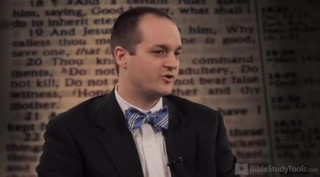
Change Translation
- Recent Translations
- All Translations
Images for Judas 1:12


Share
Videos for Judas 1:12
Judas 1:12 Meaning and Commentary
These are spots in your feasts of charity
Or "love". The Jews speak (atwnmyhmd hytdweo) , "of a feast of faith" F2. These here seem to be the Agapae, or love feasts, of the primitive Christians; the design of which was to maintain and promote brotherly love, from whence they took their name; and to refresh the poor saints, that they might have a full and comfortable meal now and then: their manner of keeping them was this; they began and ended them with prayer and singing; and they observed them with great temperance and frugality; and they were attended with much joy and gladness, and simplicity of heart: but were quickly abused, by judaizing Christians, as observing them in imitation of the passover; and by intemperance in eating and drinking; and by excluding the poor, for whose benefit they were chiefly designed; and by setting up separate meetings for them, and by admitting unfit persons unto them; such as here are said to be spots in them, blemishes, which brought great reproach and scandal upon them, being persons of infamous characters and conversations. The allusion is either to spots in garments, or in faces, or in sacrifices; or to a sort of earth that defiles; or else to rocks and hollow stones on shores, lakes, and rivers, which collect filth and slime; all which serve to expose and point out the persons designed. The Alexandrian copy and some others read, "these are in their own deceivings, spots", (apataiv) , instead of (agapaiv) , as in ( 2 Peter 2:13 ) ;
when they feast with you;
which shows that they were among them, continued members with them, and partook with them in their solemn feasts, and were admitted to communion; and carries in it a kind of reproof to the saints, that they suffered such persons among them, and allowed them such privilege, intimacy, and familiarity with them:
feeding themselves without fear;
these were like the shepherds of Israel, who fed themselves, and not the flock, and were very impious and impudent, open and bare faced in their iniquities, neither fearing God nor regarding man.
Clouds [they are], without water;
they are compared to clouds for their number, being many false prophets and antichrists that were come out into the world; and for their sudden rise, having at once, and at an unawares, crept into the churches; and for the general darkness they spread over the churches, making it, by their doctrines and practices, to be a dark and cloudy day, a day of darkness, and gloominess, a day of clouds, and of thick darkness, a day of trouble, rebuke, and blasphemy; and for the storms, factions, rents, and divisions they made; as also for their situation and height, soaring aloft, and being vainly puffed up in their fleshly mind; as well as for their sudden destruction, disappearing at once. And to clouds "without water", because destitute of the true grace of God, and of true evangelical doctrine; which, like rain, is from above, from heaven; and which, like that, refreshes, softens, and fructifies. Now these false teachers looked like clouds, that promised rain, boasted of Gospel light and knowledge, but were destitute of it, wherefore their ministry was uncomfortable and unprofitable.
Carried about of winds;
either of false doctrines, or of their own lusts and passions, or of Satan's temptations:
trees whose fruit withereth:
or "trees in autumn"; either like to them, which put forth at that season of the year, and so come to nothing; or like to trees which are bare of leaves as well as fruit, it being the time when the leaves fall from the trees; and so may be expressive of these persons casting off the leaves of an outward profession, of their going out from the churches, separating from them, and forsaking the assembling together with them, when what fruit of holiness, and good works, they seemed to have, came to nothing; and so were
without fruit,
either of Gospel doctrine, or of Gospel holiness and righteousness; nor did they make any true converts, but what they made were like the Pharisees, as bad, or worse than themselves; and from their unfruitfulness in all respects, it appeared that they were not in Christ the true vine, and were not sent forth by him, nor with his Gospel, and that they were destitute of the Spirit of God.
Twice dead;
that is, entirely, thoroughly, and really dead in trespasses and sins, notwithstanding their pretensions to religion and godliness; or the sense may be, that they were not only liable to a corporeal death, common to them with all mankind, but also to an eternal one, or to the death both of soul and body in hell. Homer calls F4 those (diyaneiv) , "twice dead", that go to hell alive: or rather the sense is this, that they were dead in sin by nature, as all men are, and again having made a profession of religion, were now become dead to that profession; and so were twice dead, once as they were born, and a second time as they had apostatized:
plucked up by the roots;
either by separating themselves from the churches, where they had been externally planted; or by the act of the church in cutting them off, and casting them out; or by the judgment of God upon them.
F2 Zohar in Exod. fol. 36. 3, 4.
F4 Odyss. l. 12. lin. 22.
Judas 1:12 In-Context
Study Tools
PLUSUnlock Notes
This feature is for PLUS subscribers only. Join PLUS today to access these tools and more.
JOIN PLUSUnlock Highlights
This feature is for PLUS subscribers only. Join PLUS today to access these tools and more.
JOIN PLUSUnlock Bookmarks
This feature is for PLUS subscribers only. Join PLUS today to access these tools and more.
JOIN PLUSTrack Your Reading
Create a free account to start a reading plan, or join PLUS to unlock our full suite of premium study tools.
